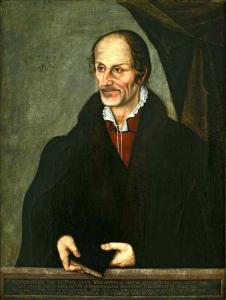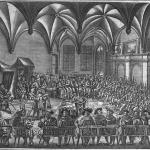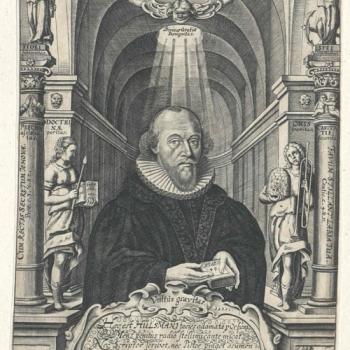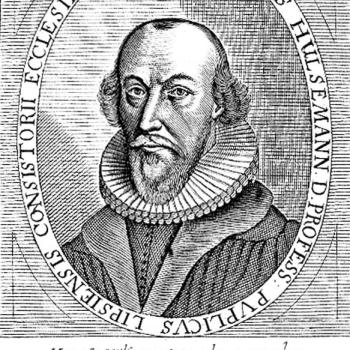“Please Hit ‘Subscribe’”! If you have received benefit from this or any of my other 4,600+ articles, please follow this blog by signing up (w your email address) on the sidebar to the right (you may have to scroll down a bit), above where there is an icon bar, “Sign Me Up!”: to receive notice when I post a new blog article. This is the equivalent of subscribing to a YouTube channel. Please also consider following me on Twitter / X and purchasing one or more of my 55 books. All of this helps me get more exposure, and (however little!) more income for my full-time apologetics work. Thanks so much and happy reading!
***
See my introductory article for this series. Excerpts from the Augsburg Confession (“AC”) will be identified and indented, in regular black font. Replies from the Catholic Confutation (“C”) will be in blue, and counter-replies from the Lutheran Apology of the Augsburg Confession (“AAC”) in green. Neither will be indented. My own comments will be in regular black font. My own scriptural citations will be drawn from the RSV.
***
Article VII. Of the Church.
1 Also they teach that one holy Church is to continue forever. The Church is the congregation of saints, in which the Gospel is rightly taught and the Sacraments are rightly administered. 2 And to the true unity of the Church it is enough to agree concerning the doctrine of the Gospel and 3 the administration of the Sacraments. Nor is it necessary that human traditions, that is, rites or ceremonies, instituted by men, should be everywhere alike. 4 As Paul says: One faith, one Baptism, one God and Father of all, etc. Eph. 4:5-6.
To Article VII. The seventh article of the Confession, wherein it is affirmed that the Church is the congregation of saints, cannot be admitted without prejudice to faith if by this definition the wicked and sinners be separated from the Church. For in the Council of Constance this article was condemned among the articles of John Huss of cursed memory, and it plainly contradicts the Gospel. For there we read that John the Baptist compared the Church to a threshing-floor, which Christ will cleanse with his fan, and will gather the wheat into his garner, but will burn the chaff with unquenchable fire, Matt. 3:12. Wherefore this article of the Confession is in no way accepted, although we read in it their confession that the Church is perpetual, since here the promise of Christ has its place, who promises that the Spirit of truth will abide with it forever John 14:16. And Christ himself promises that he will be with the church alway unto the end of the world. They are praised also, in that they do not regard variety of rites as separating unity of faith, if they speak of special rites. For to this effect Jerome says: “Every province abounds in its own sense” (of propriety). But if they extend this part of the Confession to universal Church rites, tis also must be utterly rejected, and we must say with St. Paul: “We have no such custom,” 1 Cor. 11:16. “For by all believers universal rites must be observed,” St. Augustine, whose testimony they also use, well taught of Januarius; for we must presume that such rites were transmitted from the apostles.
Article VIII. What the Church Is.
1 Although the Church properly is the congregation of saints and true believers, nevertheless, since in this life many hypocrites and evil persons are mingled therewith, it is lawful to use Sacraments administered by evil men, according to the saying of Christ: The Scribes and the Pharisees sit in Moses’ seat, etc. Matt. 23:2. Both the Sacraments and Word are effectual by reason of the institution and commandment of Christ, notwithstanding they be administered by evil men. 3 They condemn the Donatists, and such like, who denied it to be lawful to use the ministry of evil men in the Church, and who thought the ministry of evil men to be unprofitable and of none effect.
To Article VIII. The eighth article of the Confession, concerning wicked ministers of the Church and hypocrites—viz. that their wickedness does not injure the sacraments and the Word—is accepted with the Holy Roman Church, and the princes commend it, condemning on this topic the Donatists and the ancient Origenists, who maintained that it was unlawful to use the ministry of the wicked in the Church—a heresy which the Waldenses and Poor of Lyons revived. Afterwards John Wicliff in England and John Huss in Bohemia adopted this.
Article VII and VIII. Of the Church.
The Seventh Article of our Confession, in which we said that the Church is the congregation of saints, they have condemned, and have added a long disquisition, that the wicked are not to be separated from the Church since John has compared the Church to a threshing-floor on which wheat and chaff are heaped together, Matt. 3:12, and Christ has compared it to a net in which 2 there are both good and bad fishes, Matt. 13:47. It is, verily, a true saying, namely, that there is no remedy against the attacks of the slanderer. Nothing can be spoken with such care that it can escape detraction. 3 For this reason we have added the Eighth Article, . . .
Melanchthon and the AAC miss an important qualifying fact of Eck’s response. He wrote: “The seventh article of the Confession, . . . cannot be admitted without prejudice to faith if by this definition the wicked and sinners be separated from the Church” [my bolding and italics]. It’s a conditional. The brief Article VII of the AC didn’t clarify this “wheats and tares” aspect, whereas Article VIII did. Therefore, Eck stated that Article VIII was “accepted.”
For this reason the true teaching and the Church are often so utterly suppressed and disappear, as if there were no Church, which has happened under the papacy; it often seems that the Church has completely perished.
This is what I would describe as a “quasi-defectibility” position (i.e., the Lutheran view towards Catholics). The Church almost died, they say, but not quite. It hung on by a hair. And, as many Protestants would have it, it likely would have died, but for the “savior” Protestantism, which allegedly restored the true gospel and the Bible, etc.
Martin Luther himself — a thing not well-known by non-Lutherans — was actually much more pro-tradition and pro-Catholic, and often noted that he greatly preferred Catholics to folks like the Anabaptists or Zwinglians (Protestants to the ecclesiastical left of Lutheranism): particularly because of their denial of the Real Presence in the Holy Eucharist. In December 2014, I edited an entire book along these lines, called The “Catholic” Luther : An Ecumenical Collection of His “Traditional” Utterances (read the Introduction). Melanchthon was more radical, and more Protestant than Luther, according to what the movement eventually became.
And it says Church Catholic, in order that we may not understand the Church to be an outward government of certain nations [that the Church is like any other external polity, bound to this or that land, kingdom, or nation, as the Pope of Rome will say], but rather men scattered throughout the whole world [here and there in the world, from the rising to the setting of the sun], who agree concerning the Gospel, and have the same Christ, the same Holy Ghost, and the same Sacraments, whether they have the same 11 or different human traditions. . .
This is contradicted by the notorious Lutheran caesaropapist policy of the “state Church.” Germany was not one united nation in those days. In each area, it would be determined if it were to remain Catholic or become Lutheran. And whatever was decided, the people in the area were bound to follow. This is hardly freedom of conscience and religion. And it grossly contradicts the founding principles of Protestantism (private judgment and the supremacy of the individual conscience). What Melanchthon describes is far more applicable to Catholicism than Lutheranism. Here is an example of the absurdity of both the Lutheran and Calvinist unbiblical idea of the “state church”:
In 1556 the Pfalsgraf, Otto Heinrich, declared the doctrine of Luther to be the exclusive religion of the land. But his successor, Frederick III, only three years later, established Calvinism as the State religion. His son, Ludwig, however, in 1576 brought Lutheranism in again, and banished from the country all Calvinist ministers, teachers and officials. In 1583 the pendulum swung back once more, and Ludwig’s brother Johann re-established Calvinism. Thus the unhappy people, in the space of less than forty years, were compelled to change their religious faith four times, to say nothing of the original change from Catholicism to Protestantism! (John L. Stoddard, Rebuilding a Lost Faith, New York: P. J. Kenedy & Sons, 1922, 98)
Melanchthon himself famously regretted — to the point of deep depression and disillusionment — the divisions and wanton sectarianism of the “Protestant Reformation” and actually longed for bishops to return, as opposed to the initial Lutheran schema of having princes in effect replace bishops. He wrote the following letter to Cardinal Campeggio, on 4 August, 1530 (the same year as the AC):
For this reason I have often shown that if a few things were kept in the background, these divisions could be healed. In my opinion it would contribute very much to the quiet of the Church and to the dignity of the Roman See, to make peace on the conditions which I have mentioned. For also our priests should in turn render obedience to the bishops. Thus the Church would unite again in one body, and the Roman See would have its own honour, so that, if anything wrong remains in the churches, it can gradually be corrected by the care of the bishops. It is also our earnest desire to be freed from these contentions, that we may give our whole attention to the diligent improvement of doctrine. And unless this be done, wise men can easily foresee what, amid so many sects, will come upon posterity. And in this matter it is easy to see how indifferent those are whom you now oppose to us. Yesterday the Confutation of our Confession was read. If it shall be published, condemning us, believe me it will not have great admiration among judicious men, and will irritate the minds of ours. Thus there is danger that by the renewal of this whole tragedy, greater commotion than ever will ensue. Hence I desire that these evils of the Church be not increased in virulence. Therefore I beg you to indicate to me in a few words, whether you have spoken with your Reverend Master about those conditions, and what hope he will hold out. If I can obtain anything favourable I will take care that the Roman See may not repent its kindness. The feelings and desires of many good men are united in this matter, who will do all they can to enlarge the authority of the bishops and to establish the peace of the Church. (Philip Melanchthon: The Protestant Preceptor of Germany, James William Richard [Lutheran], New York: G. P. Putnam’s Sons, 1898, 213 [online link] )
they set up the worship of saints, call upon them instead of Christ, the Mediator, etc.
First of all, we do not worship saints; we venerate and honor them, which is quite biblical (see, e.g., Hebrews 11). Nor is invoking them in opposition to invoking Christ. Quite the contrary! It is a way to reach our Lord Jesus Christ by means of creatures who are holier than we are. The Bible persistently teaches that if one wants to have a prayer answered, one seeks out the holiest person they can find (per James 5:16), to intercede on their behalf.
Jesus Himself taught in the story (not a parable) of Lazarus and the rich man in Hades, that the rich man made three petitionary requests of Abraham (not God). The notion is never condemned; nor did Abraham correct the rich man who requested things of him (telling him to make such requests of God only). Since Jesus told the story, it didn’t (and can’t) have uncorrected false doctrine in it. If Jesus taught that human beings can call upon creatures, then obviously Jesus didn’t think this was contrary to the practice of praying directly to Him.
Neither must we transfer to the Popes what belongs to the true Church, namely, that they are pillars of the truth, that they do not err.
Why, then, did Martin Luther write the following (more than any pope ever said), if this sort of idea (papal infallibility) is rejected in Protestantism?:
I need not have any title and name to praise highly the word, office, and work which I have from God and which you blind blasphemers defile and persecute beyond measure. I trust my praise will overcome your defiling, just as my justice will overcome your injustice. It does not matter if, with your blasphemy, you are on top for the moment.
Therefore, I now let you know that from now on I shall no longer do you the honor of allowing you – or even an angel from heaven – to judge my teaching or to examine it. For there has been enough foolish humility now for the third time at Worms, and it has not helped. Instead, I shall let myself be heard and, as St. Peter teaches, give an explanation and defense of my teaching to all the world – I Pet. 3:15. I shall not have it judged by any man, not even by any angel. For since I am certain of it, I shall be your judge and even the angels’ judge through this teaching (as St. Paul says [I Cor. 6:3 ]) so that whoever does not accept my teaching may not be saved – for it is God’s and not mine. Therefore, my judgment is also not mine but God’s. (Against the Spiritual Estate of the Pope and the Bishops Falsely So-Called, July 1522; in Luther’s Works, Vol. 39: Church and Ministry I; pages 239-299; translated by Eric W. and Ruth C. Gritsch; this excerpt from pp. 248-249)
*
Practical Matters: Perhaps some of my 4,600+ free online articles (the most comprehensive “one-stop” Catholic apologetics site) or fifty-five books have helped you (by God’s grace) to decide to become Catholic or to return to the Church, or better understand some doctrines and why we believe them.
Or you may believe my work is worthy to support for the purpose of apologetics and evangelism in general. If so, please seriously consider a much-needed financial contribution. I’m always in need of more funds: especially monthly support. “The laborer is worthy of his wages” (1 Tim 5:18, NKJV). 1 December 2021 was my 20th anniversary as a full-time Catholic apologist, and February 2022 marked the 25th anniversary of my blog.
PayPal donations are the easiest: just send to my email address: [email protected]. Here’s also a second page to get to PayPal. You’ll see the term “Catholic Used Book Service”, which is my old side-business. To learn about the different methods of contributing (including Zelle), see my page: About Catholic Apologist Dave Armstrong / Donation Information. Thanks a million from the bottom of my heart!
*
***
Photo credit: Portrait of Philipp Melanchthon (1564), by the Workshop of Lucas Cranach the Younger (1515-1586) [public domain / Wikimedia Commons]
Summary: Catholic-Protestant “dialogue” consisting of the Augsburg Confession (Lutheran, 1530), Catholic replies (then & now), & Philip Melanchthon’s counter-reply.














